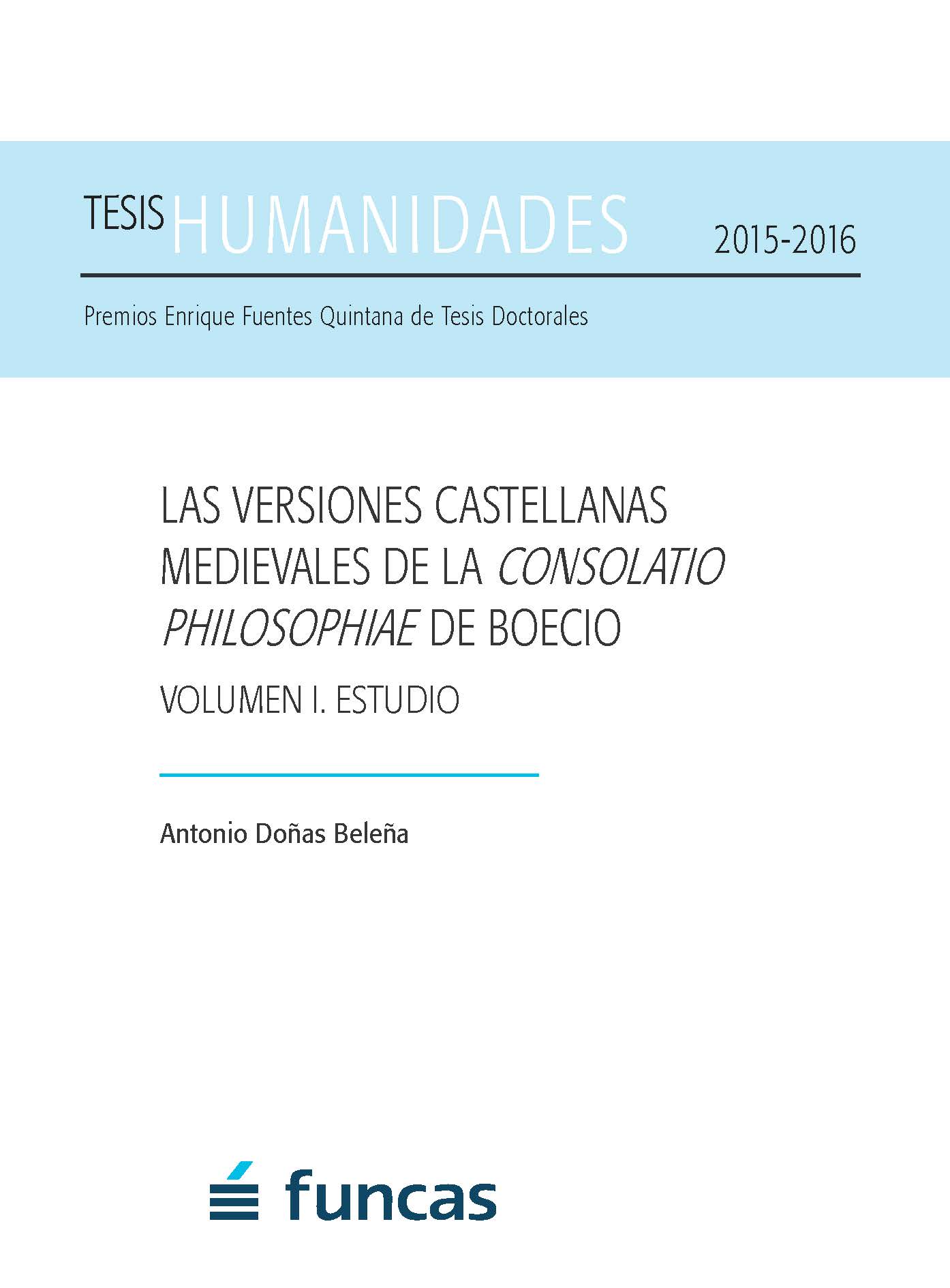
Title
Las versiones castellanas medievales de la “Consolatio Philosophiae” de Boecio
Size
Volume I: 15-520p, Volume II: 531-937p, 25x17.5cm, softcover
Language
Spanish
Released
2017
ISBN
9788415722762
Published by
Funcas
Book Info
See Book Availability at Library
Las versiones castellanas medievales de la “Consolatio Philosophiae” de Boecio
Japanese Page
Boethius was one of the most influential authors on late medieval Spain. His most important work, the Consolatio Philosophiae, was the most frequently translated text, one of the most often to be found in the total of existing vernacular manuscripts, and the work of Classical Antiquity with the highest number of vernacular printings in the era of incunabula. The roll-call of authors who took from the Consolation, either as a source, or as a key influence on form or content, includes the premier figures in Catalan and Castilian literature such as, among others, Bernat Metge, Francesc Eiximenis, Enrique de Villena, Alonso de Cartagena, Juan de Mena, Jorge Manrique and Fernando de Rojas. Boethius is likewise an indispensable presence in some of the most popular genres of 15th century literature, such as treatises on predestination, luck and free will, nobility, and the literature of consolation.
This fundamental presence of Boethius and his Consolation in late medieval Iberian literature and thought came about not just via the Latin text but, even more so, through the various Catalan and Castilian translations of the work. In both cases Boethius’s original work was accompanied, or replaced, by a hermeneutic apparatus which, based on the extensive expository tradition of Boethian studies, developed the multiple dimensions —philosophical, historical, mythological, poetic, rhetorical, astronomical, etc.— of the Consolatio Philosophiae. In the various branches of transmission of the work these expository instruments direct the reading of the work towards an ideology, certain perspectives and several specific topics, generating on occasion free standing texts little related to the original.
This book examines the vernacular presence of Boethius’ Consolatio in medieval Spain and provides an explanation for its remarkable diffusion and influence. The first volume is divided in three chapters. The first one is devoted to the figure of Boethius and the Consolatio Philosophiae and its transmission in medieval Europe. The second chapter, “Boethius and the Consolatio Philosophiae in the Middle Ages”, enlarges on the various images of Boethius circulating in the Middle Ages: politician, poet, philosopher, astronomer, mathematician, pedagogue, theologian, pagan, praeceptor amoris and, above all, hero and saint. The third chapter focuses on the study of the Iberian versions of the work. Special attention is paid to the study of the figure of Boethius in the Middle Ages and of its political application in generating some of these versions. Many medieval writers who identified with the author of the Consolatio Philosophiae portrayed themselves in their works as «Boethian figures», superimposing Boethius’ virtuous reputation on their own to enhance their own image. I have used this literary conceit as a basis to posit a main motive, perhaps the most important, for the extraordinary vernacular transmission of the work: the political agenda behind the creation of some of the versions through the individual or collective identification of their dedicatees with Boethius. The second volume consists in the critical edition of all the extant medieval Castilian versions of the Consolatio Philosophiae, a total of eight 14th and 15th century texts.
(Written by Antonio Doñas Beleña, Associate Professor, Graduate School of Arts and Sciences / 2019)
Table of Contents
Introduction
Abbreviations and Conventions
Chapter 1. Boethius and the Consolatio Philosophiae
1.1. A History of Boethian Scholarship
1.2. Politics and Religion in 5th and 6th-Century Italy
1.3. Boethius’ Life
1.4. Boethius’ Works
1.5. Appendices
Chapter 2. Boethius and the Consolatio Philosophiae in the Middle Ages
2.1. Literature Review
2.2. Images of Boethius in the Middle Ages: Mathematician, Philosopher, Theologian, Praeceptor Amoris, Hero and Saint
2.3. Transmission and Influence of the Consolatio Philosophiae
Chapter 3. Medieval Iberian Versions of the Consolatio Philosophiae
3.1. Introduction
3.2. Literature Review
3.3. Study of the Versions
3.3.1. The Catalan Versions and their Castilian Translations
3.3.2. Declaraçión del libro «De consolaçión», Castilian Version of Nicholas Trevet’s Latin Commentary
3.3.3. Boeçio de consolaçión, olim «Anonymous Interpolated Version»
3.3.4. La consolaçión natural, Castilian Translation Commissioned by Ruy López Dávalos
3.4. Appendices
Conclusions
Bibliography
VOLUME II: TEXTS
Chapter 4. Texts
4.1. Introduction
4.2. The Critical Edition of Medieval Translations
4.3. General Editing Principles
4.4. Sigla
4.5. Editions
4.5.1. The Castilian Translations of the Catalan Versions
4.5.2. Declaraçión del libro «De consolaçión»
4.5.3. Boeçio de consolaçión
4.5.4. La consolaçión natural



 Find a book
Find a book

